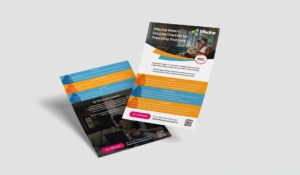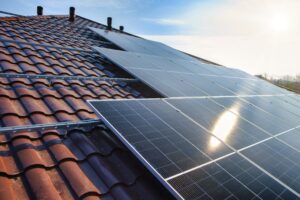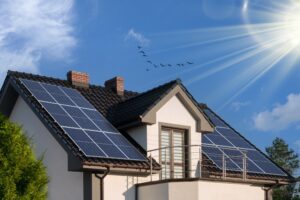Solar, or photovoltaic (PV), panels have been gaining popularity in recent years, with demand especially driven by the energy crisis. With a reported 140,000 solar panel installations in 2022, and a 67% increase in the first half of 2023, solar panel use is most definitely on the up.
As with most items sold on the market, when demand and production go up, prices usually go down, and the same also applies to solar panels. This encouraging thought in mind can be just the incentive you need to install solar panels in your home.
If you are considering getting solar panels installed, you’ll inevitably be needing a solar panel price quote. We’re here to show you what you need to consider when seeking a solar quote so you can make an informed decision.
7 Things to Consider When Getting a Solar Panel Quote
Requesting a solar panel quote is simple. You can even get your quote without having a supplier visit the property. All you need to do is answer a few basic questions online about your energy consumption and the cost of your monthly energy bills.
Based on that information, the supplier will provide detailed information about the benefits of using solar panels and their initial cost. The best part is that solar quotes are free of charge, and you’re not obligated to go with the same company that provided the quote.
In fact, solar panel experts recommend homeowners seek out no less than three quotes before committing to one supplier. This way, you can compare deals to ensure you get the best solar system for your home.
Before you get your quote, here are a few things you should consider first:
1. Type of Installation
The first step in solar system installation is to decide whether your property is better suited for ground or roof-mounted panels.
The former is typically more expensive because there are usually posts required to hold up the panels. This means additional components and labour costs.
Roof mounts are more common. As a result, roof-mounted panels are more budget-friendly than other types.
2. Shade and Local Weather
One factor that can help decide whether you’ll need a roof or ground-installed system is the weather conditions in your area, especially if you live in a snowy or cloudy region.
For example, does your roof receive constant sunlight? This can mean that you can get away with installing fewer panels.
On the flip side, if your property is mostly shaded, you may need to set up more panels to generate the same amount of energy and compensate for the lack of direct sunlight.
3. Roof Type and Age
If you decide to go with roof-mounted panels, you may be asked to install scaffolding to tilt the panels at an angle that maximises sun exposure. If your roof is already pitched at an angle, then this shouldn’t be a problem. However, there could be additional costs if you have a flat roof.
Furthermore, the roof material can also affect the pricing. Certain materials may require more work to ensure the panels are steady and properly set up at the right angle.
If the roof is old, it could require repairs or replacement in some places. This can also increase the overall cost of a solar system.
According to Microgeneration Certification Scheme (MCS) guidance for domestic solar installations, this table shows the efficiency of solar panels according to their tilt and angle.
| Tilt | Direction of the panels from due north | W | S | E | ||||
| 270° | 240° | 210° | 180° | 150° | 120° | 90° | ||
| 0° | 84% | 84% | 84% | 84% | 84% | 84% | 84% | |
| 10° | 84% | 87% | 90% | 91% | 90% | 87% | 84% | |
| 20° | 82% | 89% | 94% | 96% | 94% | 89% | 82% | |
| 30° | 81% | 90% | 97% | 100% | 97% | 90% | 81% | |
| 50° | 74% | 87% | 95% | 98% | 97% | 87% | 74% | |
| 60° | 69% | 82% | 92% | 95% | 92% | 82% | 69% | |
| 70° | 64% | 77% | 86% | 89% | 86% | 77% | 64% | |
| 80° | 57% | 69% | 78% | 81% | 78% | 69% | 57% | |
| 90° | 50% | 61% | 68% | 71% | 68% | 61% | 50% | |
Source: Microgeneration Certification Scheme
4. Hardware Type and Quality
Hardware refers to the brand and model of the panels, racking, and inverters. High-quality equipment provides better, longer-lasting performance and durability. At the same time, they tend to be more expensive.
Another factor to consider is the power density of the panels, which is the measure of the energy generated by a solar panel per unit area. Obviously, the higher the power density, the more expensive the panel installation system will be.
5. Solar Power Energy Consumption
By installing a solar system, your main goal is to rely less on the national grid by counterbalancing as much energy consumption as possible. This allows you to rely more on your own electricity, save money, and reduce your carbon footprint.
So, it’s important to factor in the number of panels you plan on installing, which is determined by how much power your property typically consumes. The more energy you use, the more panels and equipment you’ll need.
6. Interconnection Cost
Interconnection is the process of connecting your solar panel system to the national electrical grid. The cost of setting this up depends on various factors. Some of these include the type of meter your system requires, the size of the system, and any transformer upgrades you may need.
Other things to keep in mind as well are the number of solar systems in your area and the distance from the nearest interconnection point to your property. More hardware and wiring means extra fees added to the quote.
7. Tax Incentives
One way the UK government is trying to motivate homeowners to switch to solar energy is by providing them with incentives. These incentives can help offset some of the initial costs, making solar panel installations a worthy investment.
A popular example of these incentives is the 0% Value-Added Tax (VAT) until the end of March 2027. This zero-rate VAT applies to the installation and use of a handful of various energy-saving materials (ESMs) in the UK,
- Create a Tailored Quote Based On Your Circumstances
- Takes Less Than 2 Minutes
- Fixed-Online Quotes

What Does a Solar Panel Quote Include?
A comprehensive quote can break down expected costs by taking into account some basic information. The contractor or supplier company will start by asking about the location of your property. This directly impacts the number of daylight hours you get per year.
They’ll also ask about your current energy consumption. This will help them decide on the appropriate number and size of panels your home needs to effectively provide you with an adequate amount of power.
Here’s a look into a few others included in a solar panel quote:
A List of the Items in the System
A solar panel quote should list all the items that will be installed as part of the solar panel system. The list should consist of:
- The type, brand, size, and number of solar panels that will be installed
- The type of solar inverters
- The number of brackets, or racking, required to ensure durable, long-lasting installation
- Additional equipment required like tilted frames or scaffolding
Roof Plan Sketch
The quote should include a roof plan that clearly shows a proposed layout of the roof panels. It should indicate the tilt, direction, and spacing of the panels.
Not only that, but the sketch should highlight each solar panel array. This will indicate that the contractor has taken into account the cost of all necessary cables and wiring.
The Total Cost of the System
A vital component of any solar panel quote is the overall cost of installation, materials, and labour. It should also document additional expenses like split arrays or tiled roofs.
Furthermore, a thorough quote should include any exemptions you may be eligible for or discounts. This way, you can clearly see a detailed account of how much money you’d be expected to pay.
Estimated Annual Power Output
The quote should include an estimate of how much electrical power your solar system is projected to produce each year. It should also outline the power is likely to fluctuate throughout the year, depending on the season.
Projected Energy Savings
One of the best incentives for installing a solar panel system is that you get to save money. When you ask for a quote, it’s likely to include an estimate of how much money you can end up saving annually. The contractor will base this projected amount on your current yearly consumption.
Keep in mind that your overall usage may end up increasing after you install solar panels. So, you may not end up saving all that much.
Installation Warranties
Solar panel quotes should highlight whether any part of the system is covered by warranty.
Typical warranties offer a coverage of 10–25 years. Although the span and details of the coverage are different for each supplier, warranties generally guarantee that all defects in the system, such as failed isolators, disconnected cables, or loose brackets, are covered.
Many solar panel installation companies also offer a performance warranty that guarantees 90% energy production for the first 10 years and 80% production for 25 years.
To Sum Up
The advantages of installing solar panels are monumental. This renewable source of energy can help you reduce your consumption, save money on energy bills, and lower your carbon footprint.
Now that you know what you should consider when getting a solar panel quote, the process won’t be so daunting. You know what questions to ask and what to expect when you get in touch with a solar panel supplier.
If you are seeking new solar panels then leave it to Effective Heating to provide you with a highly competitive no-obligation quote.
- Create a Tailored Quote Based On Your Circumstances
- Takes Less Than 2 Minutes
- Fixed-Online Quotes




